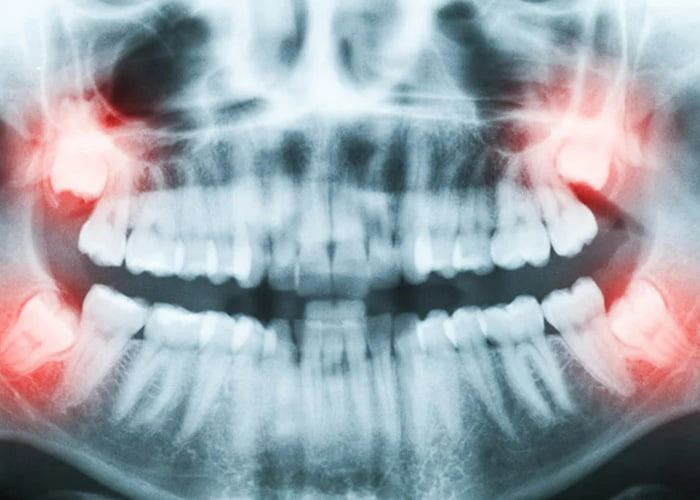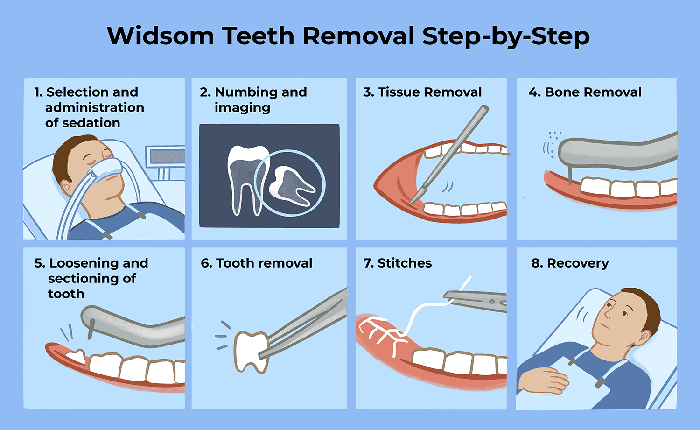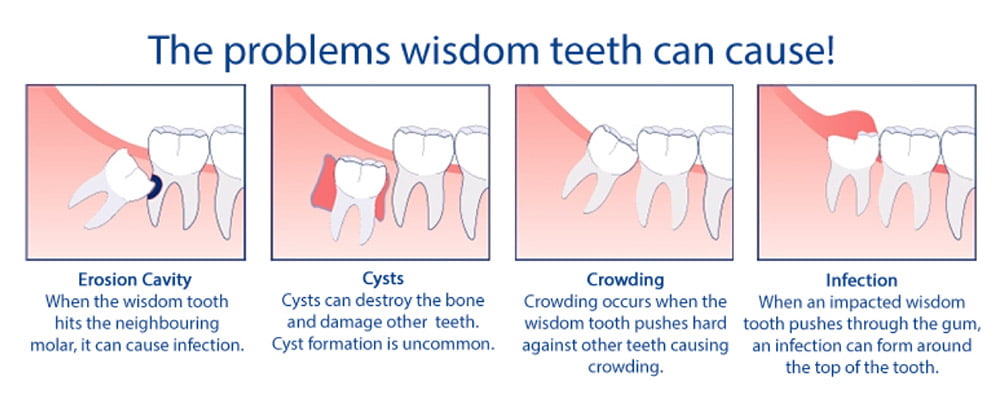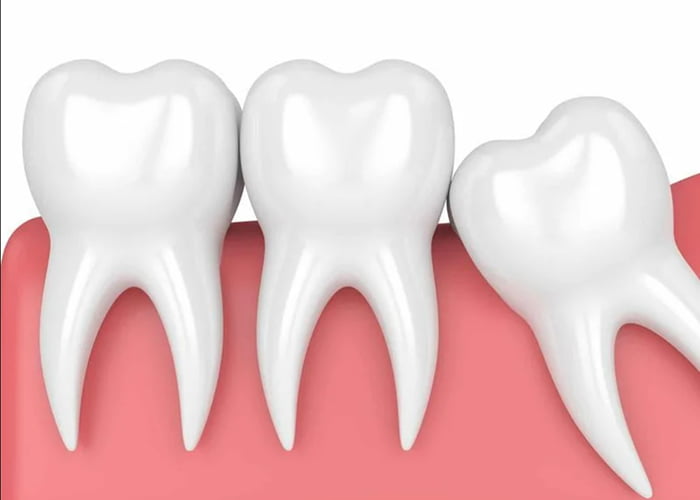Wisdom teeth extraction is a surgical procedure to remove your wisdom teeth. It is often recommended as a preventative measure to protect your other teeth from future problems and preserve your oral health.
Overview
What is wisdom teeth extraction?
Wisdom teeth extraction is the removal of your wisdom teeth (third molars) – the four permanent adult teeth located in the very back of your mouth. Wisdom teeth usually erupt between the ages of 17 and 25. Even though most people have all four of their wisdom teeth, it is not uncommon for some people to have some, or none at all. Also, for some people, their wisdom teeth may erupt normally and cause no problems.

Why do we have wisdom teeth?
Researchers believe that wisdom teeth were once extremely valuable to our ancestors to be able to eat hard nuts, crunchy leaves, raw foods, and uncooked meat. Today, we eat more cooked foods, use forks and knives to cut our food up into smaller pieces. As a result, the need for wisdom teeth is virtually nonexistent.
How do I know if I need to get my wisdom teeth removed?
Sometimes your wisdom teeth erupt normally and don’t cause any problems at all. But oftentimes wisdom teeth grow in at an angle or stay fully or partially impacted in the jawbone or under the gum tissue. This can cause a range of problems. It is difficult to predict future problems with impacted wisdom teeth. Your dentist may suggest wisdom teeth extraction if:
- You have dental pain near the back of your mouth.
- Your mouth isn’t big enough for an extra set of molars.
- Food and debris are trapped around your wisdom teeth, which may lead to gum disease.
- Your wisdom teeth have cavity.
- There is dental cyst (fluid-filled sac) around one or more wisdom teeth.
- They come in at the wrong angle. They may press against other teeth which leads to sustained damage to nearby teeth or surrounding bone.
Normally, dentists recommend your wisdom teeth to be removed as a preventative measure. They may suggest removing your wisdom teeth even if you don’t have any symptoms. This can help reduce your risk for future problems, including infection and tooth decay.
At what age should I have my wisdom teeth extracted?
People of all ages can have their wisdom teeth removed. However, our dentist at Dentist For Life recommends having them extracted as early as possible, especially during teens. During early stages, your wisdom teeth are still forming and your bone is still soft. They would be easier to remove with less risk of complications. Also, healing would be faster when you are younger. Your wisdom teeth can be removed by either your dendist or oral surgeon.;
See more: Crown and Bridge in Marrysville
Procedure Details
What happens before surgery?
You will meet with your dentist for a consultation. During this visit, he will assess your medical history, the health of your wisdom teeth, and take dental X-rays to determine their exact location. He will also discuss the risks of removing your wisdom teeth. This is a good time to ask any questions you may have about the procedure. The dentist may provide a few options for your extractions: refer you out to an oral surgeon, discuss what type of anesthesia you will have (you can either be numb or asleep during your surgery), plan time off from work or school.
What happens during surgery?

Your anesthesia will fall in one of these following types:
- Local anesthesia: Your dentist will numb your mouth with a shot of local anesthetic. You may also breathe nitrous oxide, or laughing gas, to relax or even doze during surgery. You should feel alert again shortly afterward.
- IV sedation anesthesia: The oral surgeon or dentist will numb your mouth and also give you drugs through a vein in your arm to make you drowsy. You might sleep during the whole procedure. You will not remember what happened.
- General anesthesia: You’ll either get drugs through a vein or breathe gas in through a mask. You’ll be asleep the whole time and might not wake up for an hour or so after the surgery. You will not remember what happened during the procedure.
The dentist may have to cut your gums or bone to get the tooth out if it is impacted (partially or fully). Once the wisdom tooth is visible, he carefully loosens and lifts it from its sockets, cleans the area and places stitches. The stitches shut the wound so it will heal quickly. In most cases, the stitches will fall out on their own in a few days. Your mouth will be stuffed with gauze to soak up some of the blood and to stop bleeding.
How long does wisdom teeth removal take?
Typically, wisdom teeth extraction takes about one hour or less. More complex cases may take longer.
What happens after surgery?
After wisdom teeth removal, you may experience mild discomfort, slight bleeding and swelling. The pain and swelling will be at its peak at around 2-3 days after surgery. Your dentist will give you instructions for wisdom teeth and pain management. If only local anesthetic is used, you can drive home by yourself. However, if your dentist use sedation, you will need a friend or family member to take you home.
Here are some tips for the first 3 days after surgery:
Dos:
- Apply ice pack on your face to minimize swelling.
- Gently open and close your mouth to exercise your jaw and to encourage blow flow to extraction site.
- Eat soft foods like pasta, mashed potato.
- Drink plenty of water.
- Brush your teeth starting the second day. Stay away from extraction site.
- Rinse with warm salt water.
- Take the drugs your doctor prescribes to ease pain or swelling.
- Call your doctor if you have a fever, or if your pain or swelling doesn’t improve.
Don’ts:
- Don’t drink or suck through a straw. It may loosen blood clots and cause dry socket.
- Don’t rinse your mouth too harshly.
- Don’t eat hard, crunchy, or sticky foods that may scratch your wounds.
- Don’t smoke. Smoking can slow your healing and cause dry socket.
Risks / Benefits

What are the advantages of wisdom teeth removal?
The most significant benefit of wisdom teeth extraction is that it reduces the risk for future problems such as gum disease, tooth decay, bad breath, damage to adjacent teeth, bone loss and jaw damage. If you’ve already had some pain because of your wisdom teeth, extraction can alleviate discomfort almost immediately and get you back on track to optimal oral health.
Taking wisdom teeth out early may also help prevent your teeth from crowding.
See more: Deep cleaning in Marrysville
What are the risks or complications of wisdom teeth extraction?
90% of the time, wisdom teeth removal doesn’t result in long-term complications. However, in rare instances, you may experience:
- Infection: foods trap, bad oral hygiene…
- Dry sockets (loss of blood clot resulting in exposed bone): smoking, sucking through the straws…
- Damage to other oral structures: jawbone, nerves, sinuses or nearby teeth.
Recovery
How long does it take to recover?
Most people are comfortable in three to four days, but it can take a couple of weeks for your gums to completely heal. If your denture place sutures, it will come out in about 4 days as well.
Aftercare
- Place a cold compress or ice pack on your face to help reduce swelling.
- Keep the surgical sites clean by gently soaking them with warm salt water.
- Rest as much as you can for the first few days.
- Avoid strenuous activity for 48 to 72 hours.
- Don’t swish vigorously, as this can dislodge blood clots and cause dry sockets.
- Brush the rest of your teeth normally.
What to eat
- Soft foods like pasta, rice, eggs, pudding and yogurt.
- Cool foods like ice cream can help soothe the surgical areas.
- Steer clear of hard, crunchy, hot and spicy foods, as these things can irritate your tissues.
- Avoid drinking through straws. The suction can dislodge blood clots, which are essential for healing.
When can I go back to work or school?
Most people can go back to work or school in two to three days after wisdom teeth extraction. However, if your job requires physical labor or heavy lifting, you may need to take a few extra days off of work.
When to Call the Doctor
When should I see my dentist?
You should call your dentist if you have:
- High fever of 100.4 degrees Fahrenheit and above.
- Infection (pus) coming out of extraction site.
- Heavy and non-stop bleeding.
- Pain that doesn’t improve with medications.
- Swelling that worsens after three days.
- Facial numbness.
- Difficulty swallowing or breathing.
- Blood or pus in nasal drainage.
In summary, dentists can use restoration methods such as fillings and bridges to help patients regain normal eating and chewing function. However, these methods have their own advantages and disadvantages, and the decision to use a specific method depends heavily on each individual patient’s case. If you need to replace a tooth or need support in maintaining good oral health, contact Dentist in Marysville for advice and support. With years of experience and professionalism, the experts at Dentist in Marysville will help you have a bright smile and the best oral health.



